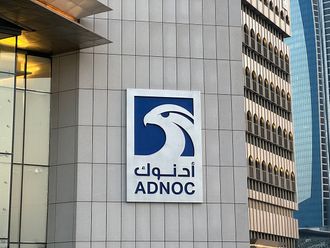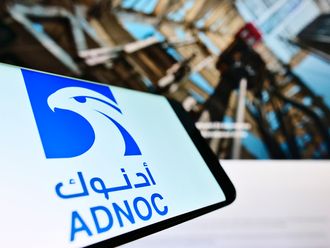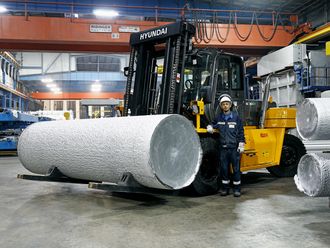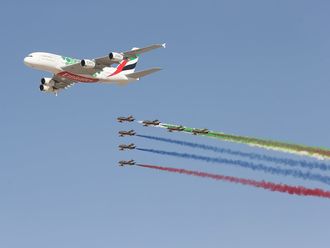London: Royal Dutch Shell Plc, Europe's biggest oil company, posted a 57 per cent increase in earnings after production climbed for the first time in more than three years following start-ups in Brazil and Russia.
Net income in the first quarter rose to $5.48 billion (Dh20.15 billion) from $3.49 billion a year earlier, The Hague-based Shell said in a statement yesterday. The shares jumped to the highest in almost two years in London trading after earnings adjusted for inventories and one-time items beat analyst estimates.
Chief Executive Officer Peter Voser, who is seeking to close a performance gap with BP Plc, said Shell is in a "delivery window for new growth" with 13 projects due to start this year and next. "There is more to come from Shell," he said, with projects from the Gulf of Mexico to Singapore set to underpin growth targets out to 2012.
"These are very strong results," Peter Heijen, an Amsterdam-based analyst at Theodoor Gilissen Bankiers NV who has a "buy" rating on the stock, said in an interview. "There's strong production growth and the company is well-positioned with more projects that are coming onstream."
Shell is the second of the world's biggest oil companies to report earnings this week. BP, which is battling a 1,000-barrel-a-day leak in the Gulf of Mexico, said first-quarter profit more than doubled to $6.08 billion. ExxonMobil Corp, the largest US oil company, is scheduled to report earnings today.
Adjusted profit
Excluding one-time items and inventory changes, Shell earned $4.83 billion. That beat the $4.03 billion median estimate of 13 analysts surveyed by Bloomberg.
Shell's Class-A shares rose as much as 3.3 per cent to 2,063.5 pence in London, the highest since June 30 2008. They were 64 pence higher at 2,061.5 pence as of 11:15am local time.
The producer is cutting thousands of jobs and seeking to sell refineries amid a backdrop of excess capacity and weak demand. Shell is betting on oil-sands ventures in Canada and other unconventional projects such as a gas-to-liquids plant in Qatar and coal-seam gas reserves in Australia to reverse a seven-year decline in production.
Total production rose 6 per cent to an average of 3.594 million barrels of oil equivalent a day. That followed the ramp-up of the Sakhalin-2 venture in Russia's Far East and the BC-10 project in Brazil. Shell is assessing more than 35 projects that may add 8 billion barrels of oil equivalent resources, boosting production until 2020.
Shell's plans to dispose of 15 per cent of its refining capacity and retail assets in Africa and Latin America are "on track," Voser said.
The company is in talks with companies other than India's Essar Oil Ltd. regarding the sale of three refineries in Europe, Chief Financial Officer Simon Henry said.












